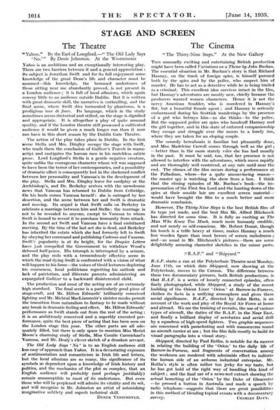STAGE AND SCREEN The Theatre
Yahoo is an ambitious and an exceptionally interesting play. There are two barriers between it and a general appreciation : its subject is Jonathan Swift and for its full enjoyment some knowledge of the great Dean's life and character must be assumed—this knowledge, the bemused undertones of those sitting near me abundantly proved, is not present in a London audience ; it is full of local allusions, which again convey little to an audience outside Dublin. But it is written with great dramatic skill, the narrative is enthralling, and the final scene, where Swift dies tormented by phantoms, is a prodigious tour de force. Its language, which in the study sometimes seems rhetorical and stilted, on the stage is dignified and appropriate. It is altogether a play of quite unusual quality, and if the London theatre still possessed a cultivated audience it would be given a much longer run than it now can have in this short season by the Dublin Gate Theatre.
The action of the play takes place in Dublin. In the first scene Stella and Mrs. Dingley occupy the stage with Swift, who reads them the conclusion of Gulliver's Travels in manu- script and castigates the human race in his matchless satiric prose. Lord Longford's Stella is a gentle negative creature, quite unlike the courageous character whose wit was supposed to have been the terror of her contemporaries, and a possibility of dramatic effect is consequently lost in the slackened conflict between her personality and Vanessa's in the development of the play. Stella and Mrs. Dingier leave for cardplay at the Archbishop's, and Dr. Berkeley arrives with the unwelcome news that Vanessa has returned to Dublin from Celbridge. On his heels comes Vanessa herself : she is outraged by her desertion, and the scene between her and Swift is dramatic and moving. Its sequel is that Swift calls on Berkeley to celebrate a marriage between him and Stella ; the marriage is not to be revealed to anyone, except to Vanessa to whom Swift is bound to reveal it to purchase immunity from attack. In the second act Swift and Vanessa have a final embittered meeting. By the time of the last act she is dead, and Berkeley has inherited the estate which she had formerly left to Swift by obeying her command and publishing Cadenus and Vanessa. Swift's popularity is at its height, for the Drapier Letters have jJst compelled the Government to withdraw Wood's debased half-pence. His triumph is interrupted by a seizure, and the play ends with a tremendously effective scene in which the mad dying Swift is confronted with a vision of what will happen to his fame—the voices of timid lecturers deploring his coarseness, local politicians regretting his outlook and lack of patriotism, and illiterate parents administering an expurgated Gulliver to a backward disinterested child.
The production and most of the acting are of an extremely high standard. The final scene is a particularly- good piece of stage-craft, and Mr. Hilton Edwards' brilliantly conceived lighting and Mr. Micheal MacLiammdir's sinister masks permit the transition from naturalism to fantasy to be made without any break in dramatic feeling and effect. Mr. Hilton Edwards' performance as Swift stands out from the rest of the acting : it is an ambitiously conceived and a superbly executed per- formance, quite the best piece of acting that has been seen on the London stage this year. The other parts are all ade-. quately filled, but there is only space to mention Miss Meriel, Moore's charming study of Stella, Miss Coralie Carmichael's Vanessa, and Mr. Healy's clever sketch of a drunken servant. . The Old Lady Says ' No' is to an English audience still less easy of approach than Yahoo. It.is a deVastating exposure of sentimentalism and romanticism in Irish life and letters, but the local allusions are so many, the significance of its symbols so dependent upon a knowledge of Irish history and politics, and the mechanics of the plot so complex, that an English audience will probably (and perhaps justifiably) remain unsusceptible to most of its undertones. But even those who will be perplexed will admire its vitality and its wit, and will recognize in Mr. Johnston an artist of astonishing imaginative subtlety and superb technical skill.
DEREK VERSCHOYLE.


















































 Previous page
Previous page